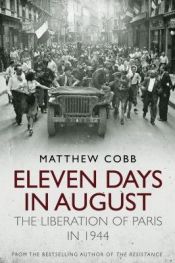Eleven Days in August
Blurb
'I had thought that for me there could never again be any elation in war. But I had reckoned without the liberation of Paris - I had reckoned without remembering that I might be a part of that richly historic day. We were in Paris on the first day - one of the great days of all time.' (Ernie Pyle, US war correspondent)The liberation of Paris was a momentous point in twentieth-century history, yet it is now largely forgotten outside France. Eleven Days in August is a pulsating hour-by-hour reconstruction of these tumultuous events that shaped the final phase of the war and the future of France, told with the pace of a thriller. While examining the conflicting national and international interests that played out in the bloody street fighting, it tells of how, in eleven dramatic days, people lived, fought and died in the most beautiful city in the world.
Based largely on unpublished archive material, including secret conversations, coded messages, diaries and eyewitness accounts, Eleven Days in August shows how these August days were experienced in very different ways by ordinary Parisians, Resistance fighters, French collaborators, rank-and-file German soldiers, Allied and French spies, the Allied and German High Commands.
Above all, it shows that while the liberation of Paris may be attributed to the audacity of the Resistance, the weakness of the Germans and the strength of the Allies, the key to it all was the Parisians who by turn built street barricades and sunbathed on the banks of the Seine, who fought the Germans and simply tried to survive until the Germans finally surrendered, in a billiard room at the Prefecture of Police. One of the most iconic moments in the history of the twentieth century had come to a close, and the face of Paris would never be the same again.

 English
English Español
Español Deutsch
Deutsch





Member Reviews Write your own review
Edward.mcwilliams
The diary entries and first hand accounts of the evens of August 1944 were fantastic for their insight. The focus of the book is very granular on Paris, even down to the events occurring on a few streets and in a few buildings. Without a thorough understanding of the events in the 19th and 20th century before 1944 which led to the German invasion and the key individuals involved, it became had to understand why the book was focusing on certain people and how they related to each other. A reader must understand Franco-Prussian history, WW1 history, and the WW2 French government in exile to really understand the context of this book. I spent as much time researching people and places of this book, as I did reading it.
Be the first person to review